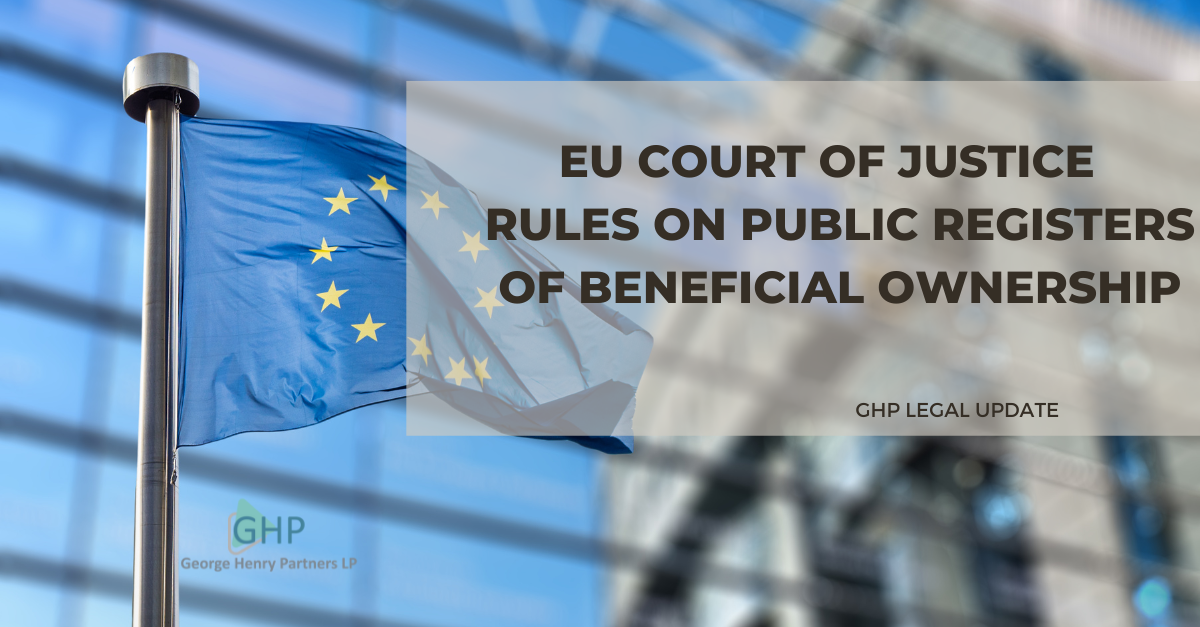Legal Update – European Court of Justice invalidates provision of the 5th Anti-Money Laundering Directive relating to public registers of beneficial ownership

In a decision handed down on 22 November 2022, the Court of Justice of the European Union (the ECJ) invalidated a provision of the 5th Anti-Money Laundering Directive (the 5AMLD) which required EU Member States to ensure that information on beneficial ownership of EU incorporated entities is accessible in all cases to ‘any member of the general public’ (Beneficial Ownership Information).
The ECJ considered that such public access constitutes a serious interference with the fundamental rights guaranteed in Articles 7 and 8 of the Charter of Fundamental Rights of the European Union (the Charter) relating to, respectively, respect for private life and the protection of personal data. The decision is final and binding on all EU Member States.
In its clearly reasoned judgment, the ECJ opined that:
- The limitation on the exercise of the rights guaranteed by Articles 7 and 8 of the Charter, resulting from the general public’s access to Beneficial Ownership Information, fulfils the principle of legality.
- Making available to the general public only ‘adequate’ Beneficial Ownership Information which is related to the purpose of the 4th Anti-Money Laundering Directive as amended (the 4AMLD), would not undermine the essence of the rights guaranteed by Articles 7 and 8 of the Charter.
- It is an objective of general interest to provide such public access thereby creating, by means of increased transparency, an environment less likely to be used for purposes of money laundering and terrorist financing (ML/TF). However, the principle of transparency cannot of itself be considered an objective of general interest capable of justifying interference with Articles 7 and 8 of the Charter.
- The general public’s access to Beneficial Ownership Information is appropriate for contributing to the objective of preventing the use of the EU financial system for purposes of ML/TF (the Objective).
- Notwithstanding the above, the interference resulting from the general public’s access to Beneficial Ownership Information is not strictly necessary to achieve the Objective.
(i) The ECJ noted that the 4AMLD, in the version prior to its amendment by the 5AMLD, made access to beneficial ownership information conditional upon the establishment of a ‘legitimate interest’. However, the lack of a uniform definition of the concept of ‘legitimate interest’ had given rise to practical difficulties in its application. The ECJ held that the difficulty in providing a detailed definition of the circumstances and conditions under which the public may access beneficial ownership information is no reason to resort to general public access.
(ii) To the extent that the recital in the 5AMLD states that the general public’s access to Beneficial Ownership Information allows greater scrutiny of the information by civil society, the ECJ held that the press and civil society organisations that are connected with the prevention and combatting of ML/TF have a legitimate interest in accessing Beneficial Ownership Information.
- The provisions in the 4AMLD allowing (i) any member of the general public to access the prescribed minimum Beneficial Ownership Information and (ii) Member States to provide access to ‘additional information enabling the identification of the beneficial owner’ are not sufficiently defined and identifiable. Accordingly, such provisions do not meet the requirement of clarity and precision.
- Unlike the previous version of the 4AMLD which provided for access by competent authorities and financial intelligence unities, entities required to carry out customer due diligence and any person or organisation capable of demonstrating a ‘legitimate interest’, the regime introduced by the 5AMLD was a more serious interference with the rights enshrined in Articles 7 and 8 of the Charter without being offset by any additional benefits.
- The optional provisions of the 4AMLD, which allow Member States to make information on beneficial ownership available on condition of online registration and to provide for exemption from access in exceptional circumstances, were not in themselves capable of achieving the appropriate balance between pursuance of the Objective and respect for the rights enshrined in Articles 7 and 8 of the Charter.
What are the implications of this decision?
It is evident from the ECJ’s decision that more restricted access to public registers of beneficial ownership is preferred and indeed required by the Charter. Member States have already taken down public beneficial ownership registers in response to the judgment.
The ECJ appeared to look favourably upon an approach that restricts access to Beneficial Ownership Information to persons who are able to show a ‘legitimate interest’ (including competent authorities and financial intelligence units, any entity required to carry out customer due diligence, the press, and certain members of civil society).
It also appears from the reasoning of the ECJ that any public beneficial ownership regime that is likely to satisfy the requirements of the Charter should set out a detailed definition of the circumstances and conditions under which the public may access Beneficial Ownership Information. Additional acceptable safeguards may include a mandatory requirement for an online registration process to access such information (including payment of a fee), clear specifications as to what additional Beneficial Ownership Information Member States may request in their national laws as well as exemptions from access.
The British Virgin Islands intends to introduce publicly accessible beneficial ownership registers during the course of 2023. It has already undertaken significant preparatory steps in this regard. The judgment of the ECJ is not binding on the United Kingdom or its overseas territories. The Governor’s Office has nevertheless indicated that it will work with colleagues in the British Virgin Islands and the United Kingdom to understand the implications of the judgment while the Territory continues its work towards publicly accessible registers of beneficial ownership.
| JERMAINE O CASE
Senior Associate │George Henry Partners LP 📞 + 1 284 393 7004 │ + 1 284 346 4422
|
Copyright © George Henry Partners LP
The content of this guide is intended for general information purposes only and is current as at the date of publication indicated. This guide does not constitute legal advice and should not be relied upon as such. You should always seek specific legal advice that takes into account your individual circumstances.
